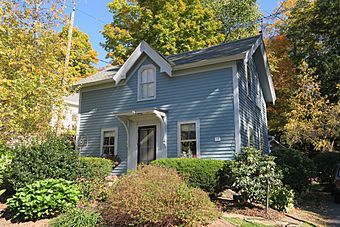East Leverett Historic District facts for kids
Quick facts for kids |
|
|
East Leverett Historic District
|
|

Jervis Gilbert House
|
|
| Location | Leverett, Massachusetts |
|---|---|
| Built | 1790-1910 |
| NRHP reference No. | 13001131 |
| Added to NRHP | January 29, 2014 |
The East Leverett Historic District is a special area in Leverett, Massachusetts. It protects an old mill village called East Leverett. This district is found where Cushman Road and Shutesbury Road meet.
Most of the buildings here are homes. They were built between 1790 and 1910. This was when the area was busy with factories and mills. The buildings show off styles like Federal and Greek Revival architecture. In 2014, this district was added to the National Register of Historic Places. This means it's an important historical site.
Contents
Exploring East Leverett's Past
How the Village Began
The town of Leverett became its own town in 1774. Before that, it was part of Sunderland. The area known as East Leverett was added to Sunderland in 1729. This was done to get more land for farming.
East Leverett village is in the southeastern part of Leverett. There has been a bridge over Roaring Brook here since at least 1794. Cushman Road and Still Corner Road meet near the bridge. Cemetery Road also runs nearby. These roads were once part of a main route. It connected Sunderland to places in Worcester County to the east.
The area near the bridge was important for small factories. These factories operated from the late 1700s to the mid-1800s. This helped the village grow into a busy center.
Old Buildings and Homes
East Leverett really started to grow after 1794. More land was sold, and many houses were built. The oldest buildings still standing in the district are from this time.
One of the oldest homes is at 21 Still Corner Road. It was built around 1806. The Nutting brothers, who owned some of the mills, built it. This house is in the Federal style. Another old house is at 173 Shutesbury Road, built around 1800. It might have been part of a mill because it's on land that slopes down to Roaring Brook.
Building continued through the early 1800s. Many homes in the Greek Revival style were built then. The East Leverett School was also built around 1835. It was needed because more families were moving to the area.
Changes Over Time
In the second half of the 1800s, the small mills in the village became less efficient. This caused the local economy to slow down. The old mill buildings are gone now. But you can still find parts of their foundations. These include old waterways called mill raceways and other stone structures.
Because of the economic slowdown, fewer people lived in East Leverett. Not many new buildings were constructed either. There is only one house left that was built between 1870 and 1910. It is the largest house in the district. This Queen Anne Victorian home is located at 167 Shutesbury Road.



